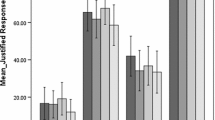Abstract
In this paper, I argue that the “Ought Implies Can” (OIC) principle, as it is employed in epistemology, particularly in the literature on epistemic norms, is open to counterexamples. I present a counterexample to OIC and discuss several objections to it. If this counterexample works, then it shows that it is possible that S ought to believe that p, even though S cannot believe that p. If this is correct, then OIC, considered from an epistemic point of view, is false, since it is supposed to hold for any S and any p.
Similar content being viewed by others
References
Alston, W. (1985). Concepts of epistemic justification. The Monist, 68, 57–89.
Alston, W. (2005). Beyond justification: dimensions of epistemic evaluation. Ithaca: Cornell University Press.
Blum, A. (2000). The Kantian versus Frankfurt. Analysis, 60, 287–288.
Boghossian, P. A. (2003). The normativity of content. Philosophical Issues, 13, 31–45.
Bonjour, L. (1985). The structure of empirical knowledge. Cambridge: Harvard University Press.
Bykvist, K., & Hattiangadi, A. (2007). Does thought imply ought? Analysis, 67, 277–285.
Chrisman, M. (2008). Ought to believe. Journal of Philosophy, 105, 346–370.
Douven, I. (2008). The lottery paradox and our epistemic goal. Pacific Philosophical Quarterly, 89, 204–225.
Feldman, R. (2000). The ethics of belief. Philosophy and Phenomenological Research, 60, 667–695.
Gibbard, A. (2005). Truth and correct belief. Philosophical Issues, 15, 338–350.
Graham, P. A. (2011). ‘Ought’ and ability. Philosophical Review, 120, 337–382.
Hattiangadi, A. (2010). The love of truth. Studies in History and Philosophy of Science, 41, 422–432.
Kornblith, H. (2001). Epistemic obligation and the possibility of internalism. In A. Fairweather & L. Zagzebski (Eds.), Virtue epistemology: essays on epistemic virtue and responsibility (pp. 231–248). New York: Oxford University Press.
Latus, A. (2000). Our epistemic goal. Australasian Journal of Philosophy, 78, 28–39.
Littlejohn, C. (2012). Does ‘ought’ still imply ‘can’? Philosophia. doi:10.1007/s11406-012-9366-5.
Mizrahi, M. (2009). ‘Ought’ Does Not Imply ‘Can’. Philosophical Frontiers, 4, 19–35.
Moser, P. (1989). Knowledge and evidence. New York: Cambridge University Press.
Neta, R. (forthcoming). Does the epistemic ‘Ought’ imply the cognitive ‘Can’? In A. Fairweather (Ed.), Naturalizing epistemic virtue. Cambridge, MA: Cambridge University Press.
Podlaskowski, A. C. (2010). Unbelievable thoughts and doxastic oughts. Theoria, 76, 112–118.
Saka, P. (2000). Ought does not imply can. American Philosophical Quarterly, 37, 93–105.
Schwitzgebel, E. (2010). Belief. In E. N. Zalta (Ed.), The Stanford Encyclopedia of Philosophy (November 21, 2010). http://plato.stanford.edu/entries/belief/.
Vranas, P. B. M. (2007). I ought, therefore I can. Philosophical Studies, 136, 167–216.
Whiting, D. (2010). Should I believe the truth? Dialectica, 64, 213–224.
Acknowledgments
I would like to thank three reviewers of Philosophia for helpful comments on an earlier draft.
Author information
Authors and Affiliations
Corresponding author
Rights and permissions
About this article
Cite this article
Mizrahi, M. Does ‘Ought’ Imply ‘Can’ from an Epistemic Point of View?. Philosophia 40, 829–840 (2012). https://doi.org/10.1007/s11406-012-9389-y
Received:
Revised:
Accepted:
Published:
Issue Date:
DOI: https://doi.org/10.1007/s11406-012-9389-y



